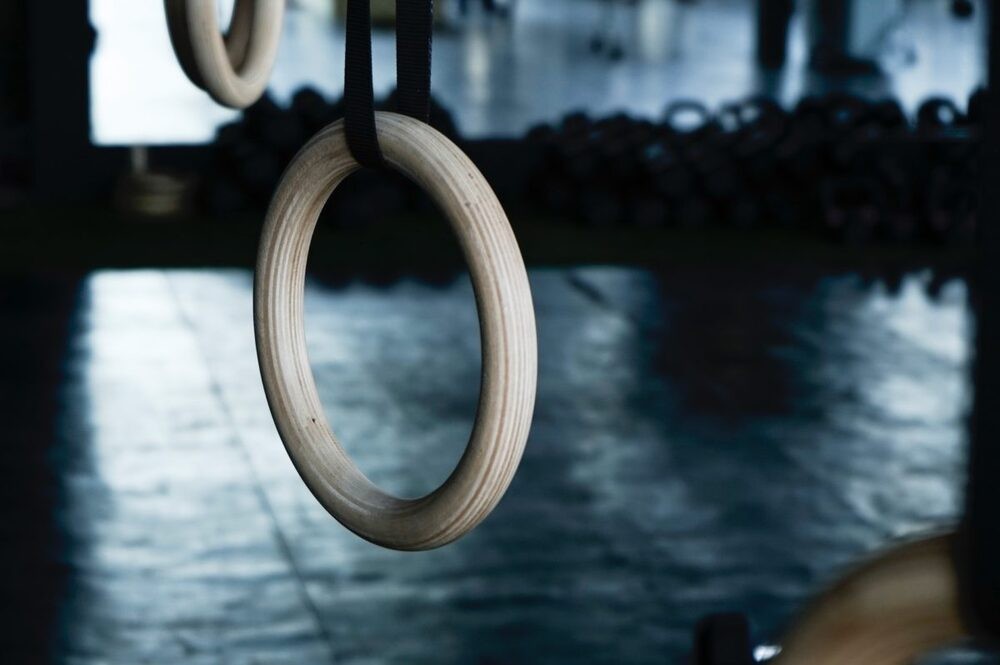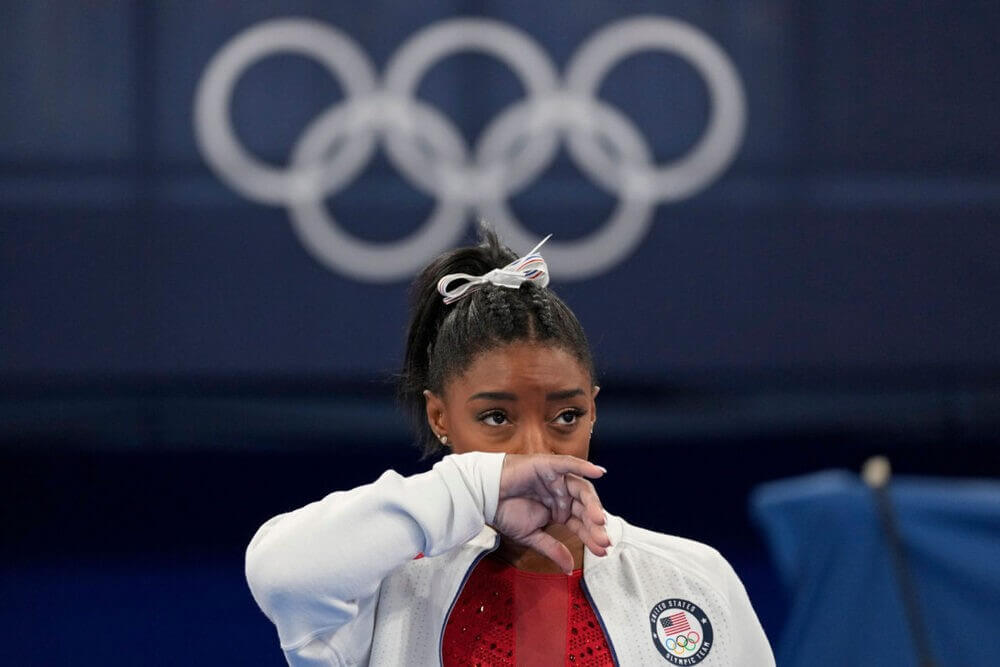Mental health
14.03.2022
The Reality of Mental Health Struggles Among Olympic Athletes

-
Members of the discussion:
-
Last reply:
Imagine sprinting 82 feet down a narrow runway, launching yourself onto a springboard, vaulting off of a four-foot-high table, and then performing 2 flips and 2 ½ twists before landing.
Now try to imagine doing that after losing your sense of balance.
And then add the pressure of doing it in front of a worldwide audience who expects you to perform it perfectly.
What kind of impact would that stress have on your mental wellbeing?
This is the exact situation Simone Biles found herself in before choosing to step down from competing in the 2020 Tokyo Olympics. She found herself racked by a case of the “twisties”, a phenomenon where a gymnast’s brain suddenly loses track of where they are in the air. Rather than risk her physical health, Biles chose not to compete in the finals and immediately found herself under a horrendous amount of backlash.
But could you perform under the same conditions?
Pressure Despite Potential Danger
After watching dozens of flawless perfect flips performed during Olympic competitions over the years, it’s easy to forget about the immense danger of these stunts. The very real risk of injury for these athletes often becomes an afterthought. They make the twists, flips, and spins look as effortless as walking down the street; especially high-level gymnasts like Simone Biles.
Her 7 Olympic medals, 4 of which are gold, only serve to support this phenomenon. She’s recognized as one of the greatest gymnasts of all time and everyone expects her to live up to that, coaches and coordinators included. During a 2016 interview with Marta Karolyi, former U.S. national team coordinator, Karolyi insisted that fear is not a problem at the elite level.
However, Biles’ difficult decision to gracefully bow out from competition showed that this isn’t the case. Only now are gymnasts starting to acknowledge and push back against this relentless pressure to perform. These elite athletes are as human as anyone else. The worldwide expectation of perfection takes a toll no matter how “used to it” you may be.

Now try to imagine doing that after losing your sense of balance.
And then add the pressure of doing it in front of a worldwide audience who expects you to perform it perfectly.
What kind of impact would that stress have on your mental wellbeing?
This is the exact situation Simone Biles found herself in before choosing to step down from competing in the 2020 Tokyo Olympics. She found herself racked by a case of the “twisties”, a phenomenon where a gymnast’s brain suddenly loses track of where they are in the air. Rather than risk her physical health, Biles chose not to compete in the finals and immediately found herself under a horrendous amount of backlash.
But could you perform under the same conditions?
Pressure Despite Potential Danger
After watching dozens of flawless perfect flips performed during Olympic competitions over the years, it’s easy to forget about the immense danger of these stunts. The very real risk of injury for these athletes often becomes an afterthought. They make the twists, flips, and spins look as effortless as walking down the street; especially high-level gymnasts like Simone Biles.
Her 7 Olympic medals, 4 of which are gold, only serve to support this phenomenon. She’s recognized as one of the greatest gymnasts of all time and everyone expects her to live up to that, coaches and coordinators included. During a 2016 interview with Marta Karolyi, former U.S. national team coordinator, Karolyi insisted that fear is not a problem at the elite level.
However, Biles’ difficult decision to gracefully bow out from competition showed that this isn’t the case. Only now are gymnasts starting to acknowledge and push back against this relentless pressure to perform. These elite athletes are as human as anyone else. The worldwide expectation of perfection takes a toll no matter how “used to it” you may be.
I truly do feel like I have the weight of the world on my shoulders at times, Biles wrote in an Instagram post before stepping down from competing. I know I brush it off and make it seem like the pressure doesn’t affect me but damn sometimes it’s hard.
A few days later, she followed up with another post: “The outpouring of love and support I’ve received has made me realize I’m more than my accomplishments and gymnastics which I never truly believed before.”
Mental Health in High-Level Sports
The multi-million dollar contracts, various product sponsorships, and nationwide recognition (or even worldwide recognition) that high-level athletes receive may seem like the dream lifestyle for the everyday individual. How could you possibly be upset when you’re paid exorbitant sums of money to play sports, more than most people make in their lifetimes?
An estimated 46.6 million adults in the United States, or about 1 in 5 people, live with mental illness. Exercise is often touted as a natural remedy for mental health troubles. Although that might be the case for people living normal lives, those healing effects fall to the wayside when you have millions of people expecting a constant stream of greatness from you.
The pressure to perform doesn’t only apply on the field, the court, or the mat, either. Many people place professional athletes on pedestals and assume the same from their overall lives. Similar to celebrities who struggle in that neverending spotlight, the demand for perfection is a strain on their mental health.
Researchers are finally looking into the mental health of athletes competing in high-level sports and the results are alarming. 33% of college-level student-athletes reported feeling considerable symptoms of anxiety, depression, or another mental health condition. Additionally, 35% of professional athletes suffer from a mental health crisis at some point.

Mental Health in High-Level Sports
The multi-million dollar contracts, various product sponsorships, and nationwide recognition (or even worldwide recognition) that high-level athletes receive may seem like the dream lifestyle for the everyday individual. How could you possibly be upset when you’re paid exorbitant sums of money to play sports, more than most people make in their lifetimes?
An estimated 46.6 million adults in the United States, or about 1 in 5 people, live with mental illness. Exercise is often touted as a natural remedy for mental health troubles. Although that might be the case for people living normal lives, those healing effects fall to the wayside when you have millions of people expecting a constant stream of greatness from you.
The pressure to perform doesn’t only apply on the field, the court, or the mat, either. Many people place professional athletes on pedestals and assume the same from their overall lives. Similar to celebrities who struggle in that neverending spotlight, the demand for perfection is a strain on their mental health.
Researchers are finally looking into the mental health of athletes competing in high-level sports and the results are alarming. 33% of college-level student-athletes reported feeling considerable symptoms of anxiety, depression, or another mental health condition. Additionally, 35% of professional athletes suffer from a mental health crisis at some point.

Michael Phelps and His Mental Health Struggles
Michael Phelps is one of the most famous Olympic athletes to date. He’s by far the most decorated Olympian of all time, collecting a total of 28 medals (with 23 of them gold) during four separate Olympic games. Phelps is the quintessential all-American athlete recognized for his incredible achievements.
However, Phelps has dealt with his own experiences living under the weight of public scrutiny, too. In perhaps the most infamous event in Olympic history, a British tabloid published a picture of him with his mouth on a marijuana bong, taken only three weeks after his record-shattering performances at the Beijing Olympics.
Phelps dealt with substance- and mental health-related problems as well. He made headlines in 2004 after being charged with driving under the influence in Maryland. 10 years later in 2014, again in Maryland, he received a second DUI charge. He attended a six-week treatment program following the first charge and received 18 months’ supervised probation after the second.
However, Phelps has dealt with his own experiences living under the weight of public scrutiny, too. In perhaps the most infamous event in Olympic history, a British tabloid published a picture of him with his mouth on a marijuana bong, taken only three weeks after his record-shattering performances at the Beijing Olympics.
Phelps dealt with substance- and mental health-related problems as well. He made headlines in 2004 after being charged with driving under the influence in Maryland. 10 years later in 2014, again in Maryland, he received a second DUI charge. He attended a six-week treatment program following the first charge and received 18 months’ supervised probation after the second.
Phelps finally revealed the extent of his struggles during an interview with David Axelrod in 2018. He opened up about his battles with anxiety and depression that punctuated his entire career. They came to a head following the 2012 Olympics in London, culminating in suicidal ideation. As Phelps described it
I didn’t want to be in the sport anymore … I didn’t want to be alive anymore.
After Biles withdrew from the Olympics, Phelps supported her decision and again recalled his own struggles.
I felt like I was carrying, like Simone said, the weight of the world on my shoulders. It’s a tough situation…I hope this is an eye-opening experience.

It’s Okay to Ask For Help
Biles added another voice to the relatively new discussion of mental health in high-level sports. Both her and Phelps’ experiences remind the everyday individual that it’s okay to be human, it’s okay to make mistakes, and it’s okay to not be okay. They’re part of the growing push to reduce the stigma surrounding mental health struggles.
Biles added another voice to the relatively new discussion of mental health in high-level sports. Both her and Phelps’ experiences remind the everyday individual that it’s okay to be human, it’s okay to make mistakes, and it’s okay to not be okay. They’re part of the growing push to reduce the stigma surrounding mental health struggles.
We also have to focus on ourselves, because at the end of the day we’re human, too. So, we have to protect our mind and body, rather than just go out there and do what the world wants us to do.
It still isn’t easy to ask for help. Admitting that you may have a problem with your substance use or mental health might feel like admitting defeat. But recognizing your need for help is the first step toward overcoming the problem. Addiction and mental health treatment programs are a vital part of the recovery of millions around the world.
Peace Valley Recovery is a premier outpatient program situated in Bucks County, Pennsylvania. Specializing in the treatment of alcohol and drug addiction, Peace Valley provides intensive, individualized care for those trying to overcome their substance abuse.
Effective treatment includes a comprehensive, well-rounded approach to recovery. Peace Valley uses a combination of traditional therapeutic methods along with a few alternative treatment modalities. We work with you to determine the path that best fits your needs and gives you the best chance at building a foundation for lasting recovery.
Peace Valley Recovery is a premier outpatient program situated in Bucks County, Pennsylvania. Specializing in the treatment of alcohol and drug addiction, Peace Valley provides intensive, individualized care for those trying to overcome their substance abuse.
Effective treatment includes a comprehensive, well-rounded approach to recovery. Peace Valley uses a combination of traditional therapeutic methods along with a few alternative treatment modalities. We work with you to determine the path that best fits your needs and gives you the best chance at building a foundation for lasting recovery.
You can fill out our insurance verification form to determine your coverage or get in touch with us today to learn more about our programs. Our admissions specialists are available and ready to answer your questions and connect you with the help you need.
Discussion
More on the topic
Mental Health in the World of Sport
Replies:
